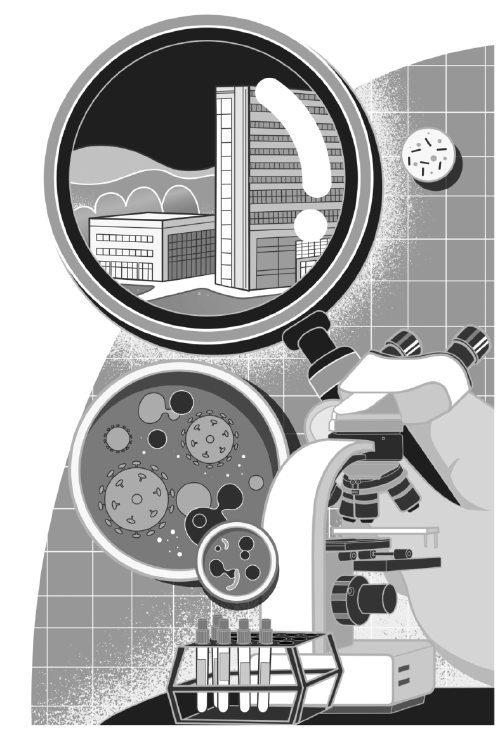Testing times for the testing companies

Editor's Note: Nucleic acid testing companies have been widely criticized recently for profiteering and faking test results in China. Does the supervision of these companies need to be strengthened? How to regulate the testing sector? Two experts share their views with China Daily. Excerpts follow:
Strict supervision over testing companies a must
Recently, nucleic acid testing companies have faced an unprecedented crisis of trust. There is even a saying that "the COVID-19 pandemic will only stop when the nucleic acid testing stops", as it is widely believed that the testing companies are "the umbrella sellers who have the power to call for rain".
In the past three years tremendous efforts have been made to fight the novel coronavirus. However, falsification of nucleic acid test results by a few testing companies is threatening to undo all the efforts to control the epidemic over that time. In response to the doubts of the public, it is necessary to conduct an in-depth analysis of the nucleic acid testing system, and strengthen supervision over the companies doing nucleic acid testing.
Generally nucleic acid tests in China are administered by designated medical institutions such as hospitals, designated agencies entrusted by the health authorities to carry out tests and third-party entities.
Among them, the second category is similar to the third, as both involve public-private cooperation. But the difference between the two is that the former is in the name of the health administration departments, while the latter is purely the market behavior of private entities.
As the demand for tests has increased in recent months, more testing has been carried out by private companies to alleviate the pressure on public health institutions. This has enabled some companies to take risks to falsify results in order to make a fat profit.
But nucleic acid testing should be a non-market activity aimed at fulfilling the public administrative task of preventing the spread of the virus. To this end, the testing companies must be supervised in the strictest way. The cost and benefit of testing must be duly evaluated and the cost controlled through administrative agreement. Besides, the whole testing process should be managed and supervised by health administrators through sampling inspection or other methods.
The accountability for testing should be assumed entirely by the health departments instead of the testing companies. Only by strengthening the duties of health administrators can supervision of the testing be effectively enhanced.
Action should be taken against any testing company found to be trying to profiteer.
Li Zhongxia, a professor at the Law School, Renmin University of China
Testing companies play their due role in fighting pandemic
First and foremost, nucleic acid testing is by far the most agile virus detection method, not only for the novel coronavirus, but also for hepatitis B, hepatitis C, AIDS and other viruses.
In the early stage of the epidemic prevention work, material incentives and professional recognition were given to encourage medical staff. Profit-making manufacturers of anti-epidemic materials and nucleic acid testing institutions should be allowed to earn reasonable profits. Only in this way can they attract social capital and other forces to invest quickly, expand their production capacity, and meet the urgent need to fight the epidemic.
And only in this way can they have enough surplus funds to invest in the R&D and promotion of new technologies, products and services, continuously improve their efficiency, and bring technological spillover benefits to other fields since nucleic acid detection methods could be used in biochemistry, molecular biology, genetics and other fields.
The price of China's domestic anti-epidemic materials and nucleic acid testing are set by the government or government procurement pricing. Whether these prices are reasonable or not depends on the government. As long as those nucleic acid testing companies do not use illegal means to bribe the pricing personnel, they should not be blamed.
Moreover, the price of nucleic acid testing in China has fallen rapidly and is far lower than in any other economy due to economies of scale and competition. It now costs less than 20 yuan ($2.86) to have a standalone test, and just several yuan to take a 10-in-1 test.
As such it's really untenable to accuse the nucleic acid testing industry in China of fishing for exorbitant profits.
In addition, one needs to take a long-term view of the development of industries. Since the emergence of nucleic acid testing in China, the past three years may be the first time the industry has flourished. Before this there was continuous investment and meager profit, even loss for some practitioners. Besides, after the pandemic is over, most of them are most likely to encounter lean times. Therefore, the industry should be allowed to obtain a reasonable return for its previous huge investment and reserve profits for the future.
Indeed, not only the nucleic acid testing industry, all people, enterprises, and industries should be allowed and encouraged to accumulate their own savings in good years to tide over difficulties in bad years.
Mei Xinyu, a researcher at the Chinese Academy of International Trade and Economic Cooperation
The views don't necessarily represent those of China Daily.

Today's Top News
- Beijing accuses Manila of trying to smear China's actions in the South China Sea
- Scientists using Chinese telesecope capture evolutionary process of mysterious flashes
- Xi: Advance building of China-Canada new strategic partnership
- Xi receives credentials of new ambassadors to China
- China's giant radio telescope observations unravel origin of cosmic enigmatic flashes
- Xi meets Canadian prime minister






























